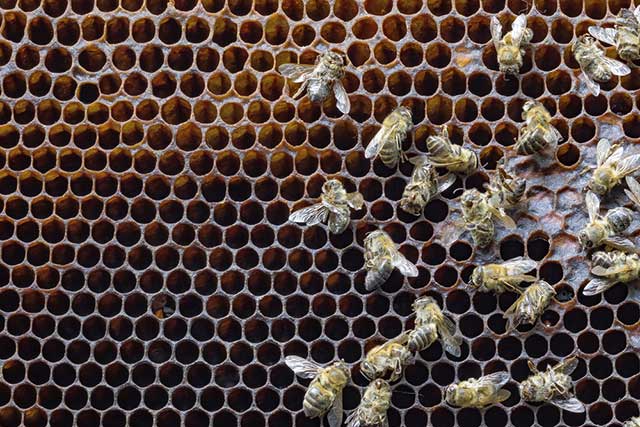
Part of the Series
Planet or Profit
Populations of bees and other species critical to agricultural pollination are declining rapidly, according to the UN’s Intergovernmental Science-Policy Platform on Biodiversity and Ecosystem Services (IPBES), which released a new report in late February.
The IPBES pointed to declines around the world, and cited human-caused climate disruption, habitat loss, pesticides, pollution, invasive species and pathogens as factors responsible for the declines.
To see more stories like this, visit “Planet or Profit?”
While the group’s report did not declare a full-scale threat, the announcement is worrisome, as bee populations have been declining around the globe steadily for the last decade, and the die-offs appear to be accelerating in occurrence.
Bayer to Blame?
“Many wild bees and butterflies have been declining in abundance, occurrence and diversity at local and regional scales in Northwest Europe and North America,” according to a statement by the IPBES. The group added that bee and other pollinator populations are declining around the rest of the globe as well.
Given that some calculations show that every third bite of food we eat was pollinated by a bee, this trend should alarm us all.
The decline in bee populations around the globe has been spreading dramatically since the winter and spring of early 2007, when during that season, a mass die-off of domesticated bees around the United States was bad enough that researchers developed the phrase “colony collapse disorder.”
That season saw some beekeepers losing more than 80 percent of their colonies, and many believe the statistics were even worse than that.
“Honey bees, which are a critical link in US agriculture, have been under serious pressure from a mystery problem: Colony Collapse Disorder (CCD), which is [a] syndrome defined as a dead colony with no adult bees or dead bee bodies but with a live queen and usually honey and immature bees still present,” according to the US Department of Agriculture (USDA).
“No scientific cause for CCD has been proven,” the USDA adds.
But the Harvard School of Public Health disagrees with this claim by the USDA: The school released a chilling study in 2014 that stated that even small amounts of neonicotinoids, a deadly pesticide used heavily on plants that bees pollinate, are likely the cause of CCD.
“We demonstrated again in this study that neonicotinoids are highly likely to be responsible for triggering CCD in honey bee hives that were healthy prior to the arrival of winter,” lead study author Chensheng (Alex) Lu of Harvard said in a statement.
The Harvard study proved that beehives exposed to even tiny amounts of two forms of neonicotinoids were far more vulnerable to CCD than unexposed hives.
The pesticide is manufactured by the Germany-based company Bayer, and is banned in Europe, but continues to be used heavily in the United States.
The Importance of Bees
“If the bee disappears from the surface of the earth, man would have no more than four years to live,” Albert Einstein once said. “No more bees, no more pollination … no more men!”
Even the conservative Economist magazine recently warned of “widespread reports of vast die-offs” and “contractions of range and wholesale extinctions” of bee colonies.
The IPBES reported that in Europe, 9 percent of bee and butterfly species are threatened with extinction and populations are declining for 37 percent of bee species and 31 percent of butterfly species for which sufficient data is available. In some places in Europe nearly half of the bee species are threatened.
The group admits to what it calls a “data gap” (lack of information) in Asia, Africa and Latin America, but suspects that similar declines are occurring, as the same drivers of CCD are present in those areas.
Simon Potts, deputy director of the Centre for Agri-Environmental Research at Britain’s Reading University and co-chair of the report, told the Guardian, “Pretty much nearly all your fruits and many of your vegetables are pollination-dependent.”
The IPBES report states that declines in pollinators like bees would lead to lower global crop yields, increased prices for food and a general reduction in profits for the agriculture industry around the world.
Nothing short of a ban of the Bayer-produced pesticide, dramatic reductions in global pollution and the halting of human-caused climate disruption will end the ongoing decline of bees and butterflies.
Our most important fundraising appeal of the year
December is the most critical time of year for Truthout, because our nonprofit news is funded almost entirely by individual donations from readers like you. So before you navigate away, we ask that you take just a second to support Truthout with a tax-deductible donation.
This year is a little different. We are up against a far-reaching, wide-scale attack on press freedom coming from the Trump administration. 2025 was a year of frightening censorship, news industry corporate consolidation, and worsening financial conditions for progressive nonprofits across the board.
We can only resist Trump’s agenda by cultivating a strong base of support. The right-wing mediasphere is funded comfortably by billionaire owners and venture capitalist philanthropists. At Truthout, we have you.
We’ve set an ambitious target for our year-end campaign — a goal of $250,000 to keep up our fight against authoritarianism in 2026. Please take a meaningful action in this fight: make a one-time or monthly donation to Truthout before December 31. If you have the means, please dig deep.